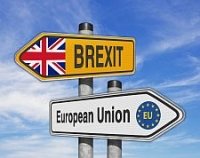
With
200 days to go until Brexit, over two-fifths (41%) of UK SMEs have not made any
preparation for the UK leaving the EU new research from OCO Global has shown.
The
levels of preparation are even more stark when comparing businesses that export
versus those that operate domestically. Almost three-quarters (73%) of SMEs
that currently export have made preparations in their business, while only a
third (33%) of domestic-only businesses have sought to get their business in
shape.
Gareth Hagan, Executive
Director, OCO Global said:
“There is a clear divergence
between those businesses that are already trading overseas versus those that
only operate domestically on preparing for Brexit.
“Exporting businesses are
clearly on the front foot. These SMEs are the businesses that are looking at
the challenges and opportunities associated with Brexit and are taking action.
However, businesses that only operate domestically are putting their futures at
risk by not putting in place measures to protect them from a Brexit fallout.”
Almost two-thirds (64%) of
SMEs stated that they had a plan in place for Brexit, however once again there
were differences between those that are trading internationally (76%) and
domestic (42%) businesses.
In preparing their businesses
for Brexit, SMEs have focussed their efforts on business development (65%),
pricing strategy (60%) and reviewing their current staffing levels (55%).
Findings from the Brexit survey also revealed different levels of preparedness
across sectors with IT, business services and construction being the most prepared.
Meanwhile, the hospitality & leisure, professional services and transport
are much less prepared.
With the Government recently
launching its new Export Strategy, designed to make the UK a “21st
Century Export Superpower”, businesses have indicated key areas that they
need support when trying to export: Access and introductions to potential
customers (26%), Market information (22%) and in-market presence and support
(22%).
Hagan continued:
“The Government has released
its guidance papers on a possible ‘no-deal’ but put simply, a no-deal is a
no-no. At the same time the new Export Strategy is ambitious and puts the
responsibility squarely on the shoulders of UK businesses.
“The impact of a no-deal is
wider than our trading relationship with the EU. It affects the UK’s
relationships elsewhere and puts businesses at a competitive disadvantage when
having to trade under WTO rules.
“Europe is, and will continue
to be, the most significant market, and so a deal with the EU that is good for
the UK must be the No 1 priority for Theresa May’s Government.”
Advice from OCO Global to businesses for preparing for
Brexit*
- Ensure adequate cash flow for
VAT and additional inventory
Charging import VAT is a duty of customs, and as a result of Brexit, companies will now face a cashflow challenge for trading cross border with the UK. Similarly, cashflow problems will be compounded for companies that need to hold additional inventory as insurance against potential border delays. Businesses should take VAT changes into account when budgeting for and purchasing stock and services, so as to ensure all parties receive payment at the required time. - Map out your supply chains
In order to
understand the impact of Brexit, companies need to map and validate their
supply chain models. A risk for Irish businesses,
for instance, is the risk of ‘double duty’ where duty mitigation measures are
not put in place. A product sourced from the UK, which has been received from a
non-EU region, such as China or the US, may have significant customs compliance
requirements. There will be a strong reliance on UK partners to facilitate the
management of such compliance measures.
- Invest in customs expertise
British
companies will need to think more strategically about customs and trade. On import
and export, there will be a requirement to file customs declarations for all
goods imported and/or exported to or from the UK. Access to customs and trade
knowledge will be essential for day to day operational activities. This is in
addition to building a robust customs function to support products crossing
international borders.
- Obtain Authorised Economic
Operator (AEO) status
Authorised
Economic Operator (AEO) status is a well-established ‘trusted trader’ customs
programme, in place in the EU since 2008. After Brexit, AEO could provide for
faster customs clearance by providing priority access to companies who have
been pre-assessed. Companies should look to incorporate AEO into their
business, where possible, as a contingency measure for dealing with the
potential of border delays.
- Intellectual Property
Intellectual property protection, including patents, trademarks, registered designs and copyright could all change after Brexit. The British Government says European patents will still apply in the UK but the UK is ‘exploring options’ in other IP areas, such as trademarks and designs, because in many cases these will lapse after Brexit. Businesses must keep close eye on the IP legislation around their particular sector, so as to protect their unique services and offerings.
